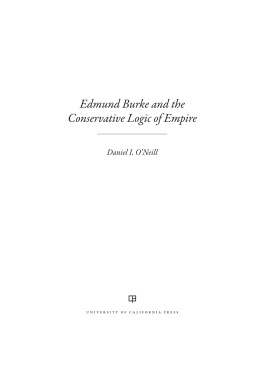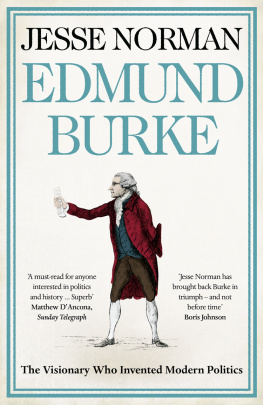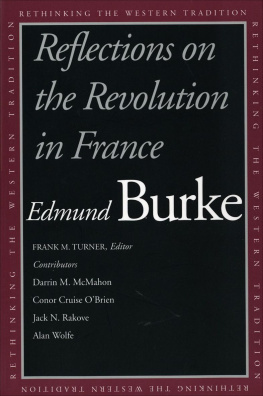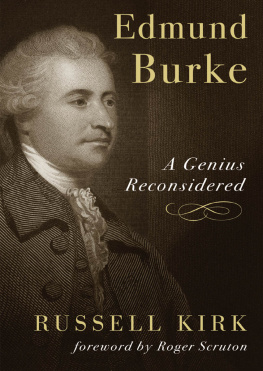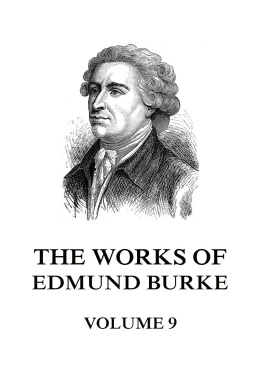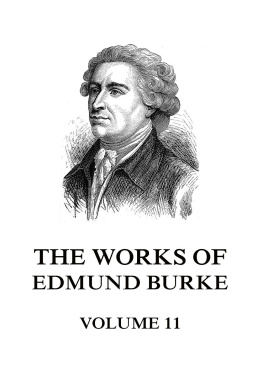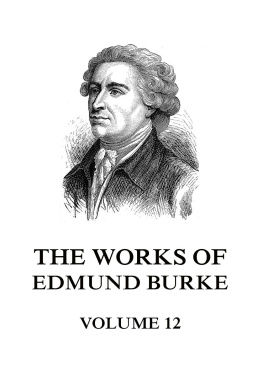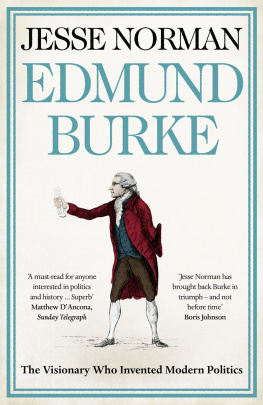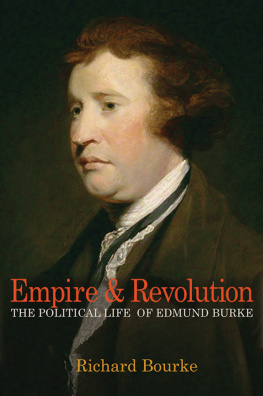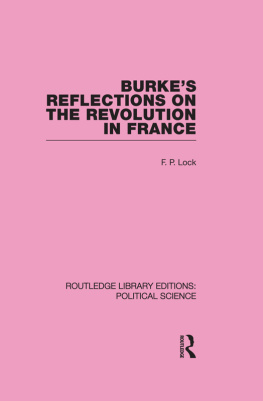ACKNOWLEDGMENTS
In a scholarly climate filled with an ever-increasing number of books claiming that Edmund Burke was neither a conservative nor a defender of empire, this book argues that he was in fact both. Nietzsche, at least, believed that such untimely meditations had their place. We shall see. Of this I am sure: Interventions of this sort certainly incur a long list of debts. Indeed, these are perhaps deeper than usual when ones views are unfashionable.
In that spirit, I thank Mark Bevir, who told me about the Berkeley Series in British Studies at its inception and never wavered in his willingness to have the book reviewed for it, even when the writing took longer than I had hoped. I also thank both external readers of the manuscript, Don Herzog and David Cannadine, whose own work, as well as their reviews, made this a much better book than it otherwise would have been. Professor Herzogs Poisoning the Minds of the Lower Orders helped give me the courage of my convictions, while Professor Cannadines notion of Ornamentalism was instrumental in broadening the conceptual framework that informs the finished product. I am also greatly indebted to Manu Samnotra for his meticulous reading of the entire book, his detailed written commentary on it, and the long hours we spent in discussion of its central arguments. Duncan Bell provided invaluable feedback on portions of the manuscript. Terry Ball has been a terrific mentor and offered sage professional advice throughout the writing process. Carole Patemans deep understanding of and spirited commitment to democracy continue to guide all of my thinking.
The book has also benefited from being vetted at various conferences. In particular, I thank Dan Kapust for inviting me to present parts of the argument at the University of Georgia Ethics and Political Philosophy Workshop, and then again at the University of Wisconsin-Madisons conference Theorys Landscapes: Movements, Memories, and Moments. Dans keen intellect and good humor have been equally valuable. I am also grateful to the members of Cornell Universitys Political Theory Workshop for allowing me to present my overarching argument there at an early stage in its development. Onur Ulas Ince, in particular, offered very helpful advice. The trip to Cornell also afforded me the opportunity to speak at length with Isaac Kramnick, who first taught me about Burke long ago, and who remains one of the very best interpreters of Burkes political thought. Les Thiele, my political theory colleague at the University of Florida, has been a great sounding board and a source of intellectual inspiration. Michael Goodhart has unfailingly listened to various iterations of my arguments over the years and has always made them better. The project was also improved by a wide range of colleagues, readers, discussants, conference participants, and students, including (but not limited to): Leslie Anderson, Mark Antaki, Badredine Arfi, Richard Avramenko, Lina Benabdallah, Michael Bernhard, Thomas Biebricher, Richard Boyd, Lorna Bracewell, Mauro Caraccioli, Ross Carroll, Alec Dinnin, Larry Dodd, Clem Fatovic, Jenn Forshee, Zephyr Frank, Dustin Fridkin, Iain Hampsher-Monk, Michael Hanchard, Ryan Patrick Hanley, Abdourahmane Idrissa, Helen Kinsella, Peggy Kohn, Antis Loizides, J. Maggio, Michael Martinez, Inder Marwah, Kirstie McClure, Bryon Moraski, Jeanne Morefield, Onur Muftigil, Conor ODwyer, Johnathan ONeill, Ido Oren, Anthony Pagden, Christopher Parker, Brian Smith, Dan Smith, Seaton Tarrant, Ben J. Taylor, Megan Thomas, Brandon Turner, Koen Vermeir, James Vernon, Sean Walsh, Luise White, Stephen K. White, and of course the late and very much missed Victor Wolfenstein. I also thank the director of the University of California Press, Niels Hooper; Bonita Hurd for her copyediting expertise; and Bradley Depew.
My greatest debts, of course, are to my family. Anastasia, I could never have written this or any other book without your support. Cassidy and Jack, you continue to remind me daily of what matters most.

